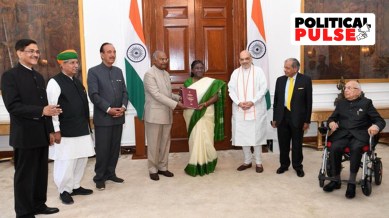* Bharatiya Janata Party
In its submission, dated February 20 this year, and interaction in person with the high-level committee, the BJP noted that simultaneous elections “worked seamlessly between 1952 and 1967”, and that in several reports subsequently, the Election Commission and other panels backed One Nation, One Election.
The party talked about “significant loss of up to 800 days in five years” due to the MCC, saying this adversely affected developmental work and governance efficiency; as well as about the repeated diversion of security forces from crucial internal security duties. The BJP proposed a single electoral roll for all three tiers of government.
The party specifically gave the example of Maharashtra, where it said 307 days had been lost to the MCC in a specific year.
* National People’s Party
The only other national party to support simultaneous polls, the ruling Meghalaya party and an NDA member said in its letter to the Kovind panel on January 28 that while it agreed with the idea in principle, separate consultations should be held with regional parties in the Northeast.
* All India Anna Dravida Munnetra Kazhagam
In its response, on January 13, the Tamil Nadu-based AIADMK cited reduction in “disruptions” due to the MCC and administrative convenience as the advantages of simultaneous elections. However, it advocated that a “definitive period” be set aside “for getting necessary infrastructure”. The AIADMK was an ally of the BJP till recently.
Story continues below this ad
* Apna Dal (Soneylal)
The UP-based ally of the BJP supported simultaneous elections on the premise of (i) difficulties faced by political parties in contesting frequent elections and (ii) the repeated application of the MCC hindering development activities. The Apna Dal (S) further suggested learning from the “good practices” of other countries like Indonesia, South Africa, and Sweden.
* Asom Gana Parishad
The BJP’s Assam-based ally refuted fears that simultaneous elections are impractical or involve Constitutional contradictions. It highlighted instead the challenges posed by frequent elections, stressing the negative impact on governance and the financial strain on government agencies.
* Biju Janata Dal
The long-standing ruling party of Odisha, which already sees simultaneous elections along with the Lok Sabha, has always supported One Nation, One Election. Its argument is that continuous polls cause fiscal strain and delays in governance, while simultaneous polls would help improve coordination and execution of development programmes and reinforce cooperative federalism.
The BJD, which has always sided with the Modi government on crucial issues and is in talks with the BJP for an alliance, hoped that the Kovind panel would take the issue to “its logical conclusion”.
Story continues below this ad
* Janata Dal (United)
The party which has returned into the NDA fold said simultaneous elections help save costs and ensure policy continuity, encourage focused governance, and streamline the election process. The party, however, suggested that local body elections not be clubbed with Lok Sabha and Assembly polls, as these are held in different states under different laws. Instead, it suggested local elections across the country at the same time.
* Lok Janshakti Party (R)
The BJP ally supported simultaneous elections as “a transformative proposal”, setting “a new milestone in strengthening the democratic process”, while promoting free and fair elections, transparency, accountability, reduction in election expenditures, as well as “greater stability, national unity”.
* All Jharkhand Students’ Union (AJSU), National Democratic Progressive Party (NDPP)
The two BJP allies (based in Jharkhand and Nagaland) said that simultaneous elections will reduce cost, improve governance, and minimise disruption on account of the MCC.
* Shiv Sena
The Sena faction which is in power with the BJP in Maharashtra said repeated elections resulted in financial burden, administrative paralysis, and security deployment challenges, and that simultaneous polls could lead to focused governance. In its interaction with the Kovind panel, Sena members, however, said elections to local bodies should not be synchronised with the Assembly and Lok Sabha.
Story continues below this ad
As a united party, the Shiv Sena has long dominated the Mumbai civic body, among the richest in the country.
* Shiromani Akali Dal
A former BJP ally, it submitted that simultaneous elections would save expenditure for the government, political parties, as well as candidates.
* Sikkim Krantikari Morcha
The ruling Sikkim party, which is a part of the NDA, said simultaneous elections would help optimise resource allocation, reduce financial burden, better utilise limited resources, and reduce prolonged deployment of security forces, which disrupts everyday life.
* The Others
The Pattali Makkal Katchi (PMK) of Tamil Nadu supported simultaneous polls saying these would prevent frequent interruptions to development projects, which drives up their costs. But, the PMK called for holding local body polls along with the Assemblies, two-and-a-half years after the general elections.
Story continues below this ad
The Republican Party of India (Athawale), which is a BJP ally, said frequent elections pose challenges to the public, and diverts the attention of political parties from governance to electoral activities.
The Tamil Maanila Congress (M), which is an NDA partner, said frequent MCC imposition halted development work.
Other parties who supported One Nation, One Election include the Mizo National Front, United People’s Party Liberal of Assam, NCP (Ajit Pawar), Rashtriya Lok Janata Dal, United Kisan Vikas Party, Bharatiya Samaj Party, Gorkha National Liberal Front, Hindustani Aavam Morcha, Indian Makkal Kalvi Munnetra Kazhagam, Indigenous People’s Front of Tripura, Jan Surajya Shakti, Maharashtrawadi Gomantak Party, Nishad Party, Puthia Nidhi Party, and Democratic Progressive Azad Party.
